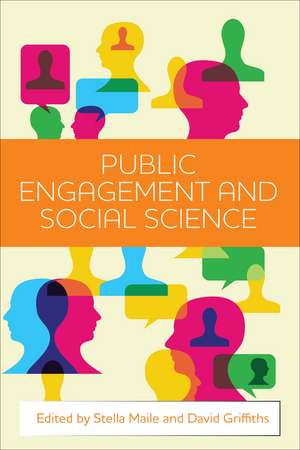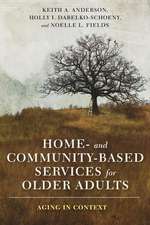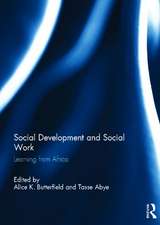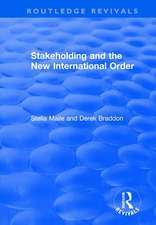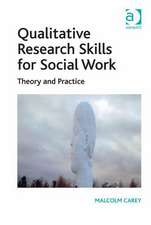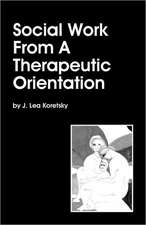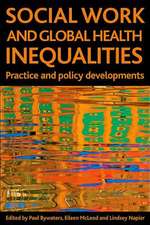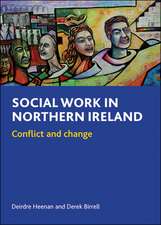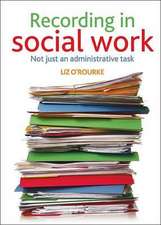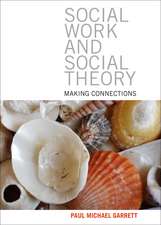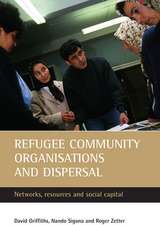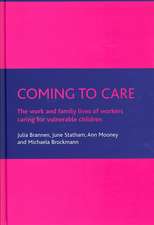Public Engagement and Social Science
Editat de Stella Maile, David Griffithsen Limba Engleză Hardback – 20 mai 2014
Drawing on social science conversations at a lively café in Bristol, this highly original book explores the value of public engagement in a wider social science context. The chapters range from themes such as the dialogic character of the social sciences, pragmatism in responses, and the underpinnings of managerial approaches to the restructuring of higher education. The first part reflects upon the different social and political inflections of public engagement. It is followed by chapters based upon talks at the café that were concerned with public engagement and the contribution of social science to a reflexive understanding of the dilemmas and practices of daily life. Together, the contributors offer a refreshing look at the role of social science in the societies it examines.
Preț: 831.19 lei
Preț vechi: 1079.46 lei
-23% Nou
Puncte Express: 1247
Preț estimativ în valută:
159.10€ • 172.87$ • 133.73£
159.10€ • 172.87$ • 133.73£
Carte tipărită la comandă
Livrare economică 21 aprilie-05 mai
Preluare comenzi: 021 569.72.76
Specificații
ISBN-13: 9781447306863
ISBN-10: 1447306864
Pagini: 256
Ilustrații: illustrations
Dimensiuni: 152 x 229 x 20 mm
Greutate: 0.54 kg
Editura: Bristol University Press
Colecția Policy Press
ISBN-10: 1447306864
Pagini: 256
Ilustrații: illustrations
Dimensiuni: 152 x 229 x 20 mm
Greutate: 0.54 kg
Editura: Bristol University Press
Colecția Policy Press
Notă biografică
Stella Maile is a senior lecturer in the Department of Health and Applied Social Sciences and convener of Social Science in the City at the University of the West of England. She is the coauthor of two books and, most recently, author of The Meaning of the British Honours System in Everyday Life. David Griffiths is an associate lecturer at the Open University in the South West. He is the author of two books, most recently Refugee Community Organisations and Dispersal.
Cuprins
INTRODUCTION - Stella Maile and David Griffiths
PART ONE: The meaning of public engagement
Introduction to Part One - Stella Maile and David Griffiths
Café scientifique and the art of engaging publics - Stella Maile and David Griffiths
Social Science in the City™: reflections on public engagement - Stella Maile
PART TWO: Public engagement in practice
Introduction to Part Two - Stella Maile and David Griffiths
'Grab and go': some sociological musings on the 2011 'disturbances' - Steve Hunt
1976 –the moral necessity of austerity - Matthew Clement
The Occupy movement - Samantha Fletcher
'Brave new world': how will the government respond to the social care challenge of an ageing population? - Robin Means
Road wars: contesting paradigms of road safety, public space and well-being - Richard Kimberlee
Restorative justice, community action and public protection - Kieran McCartan and Nikki McKenzie
Chew ’em up or throw ’em up? Disorganised responses to interpersonal(ity) disorder and social disease - Christopher Scanlon and John Adlam
Resilience - Paul Hoggett
PART THREE: Applying Social Science in the City™ and beyond
Introduction to Part Three - Stella Maile and David Griffiths
Social science and severely troubled children – working in partnership, working in and on relationship - Anne-Marie Cummins and Jem Thomas
The professional impact of Social Science in the City™ - Tansy Clark
Sharing worlds: managing complex community relationships in challenging times - Hen Wilkinson
Talking about personal experience and its relationship to social inequality across the generations - Amanda Radix
Social Research, community engagement and learning through partnerships: a collaborative project - Stella Maile, with Grace Aciro, Bethany Addicott, Laylee Arfsarpour, Joe Fitt, Georgia Leonard, Michael Nash and Annabelle Wilson
A student’s reflections on engaging in social science
CONCLUSIONS Managing public engagement - Stella Maile and David Griffiths
Recenzii
“A timely and rich contribution to discussions of public engagement and the impact of the social sciences. Through the presentation of diverse case studies, the collection provides social scientists with myriad examples of the potential practical implications of their research.”
